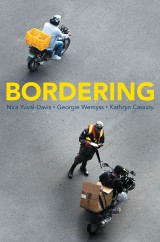Details
Bordering
1. Aufl.
|
18,99 € |
|
| Verlag: | Wiley |
| Format: | EPUB |
| Veröffentl.: | 10.06.2019 |
| ISBN/EAN: | 9781509504985 |
| Sprache: | englisch |
| Anzahl Seiten: | 240 |
DRM-geschütztes eBook, Sie benötigen z.B. Adobe Digital Editions und eine Adobe ID zum Lesen.
Beschreibungen
<p>Controlling national borders has once again become a key concern of contemporary states and a highly contentious issue in social and political life. But controlling borders is about much more than patrolling territorial boundaries at the edges of states: it now comprises a multitude of practices that take place at different levels, some at the edges of states and some in the local contexts of everyday life – in workplaces, in hospitals, in schools – which, taken together, construct, reproduce and contest borders and the rights and obligations associated with belonging to a nation-state.</p> <p>This book is a systematic exploration of the practices and processes that now define state bordering and the role it plays in national and global governance. Based on original research, it goes well beyond traditional approaches to the study of migration and racism, showing how these processes affect all members of society, not just the marginalized others. The uncertainties arising from these processes mean that more and more people find themselves living in grey zones, excluded from any form of protection and often denied basic human rights.</p>
<ul style="font-family: Verdana, Geneva, Arial, Helvetica, sans-serif; font-size: 11px;"> <li>Contents</li> <li>Acknowledgements</li> <li>Chapter 1 Introduction: Framing Bordering</li> <li>Introduction</li> <li>Bordering: in between the political and socio-cultural</li> <li>Bordering and neoliberal globalization</li> <li>Everyday intersectional bordering</li> <li>Outline of the book</li> <li>Chapter 2 Bordering, Governance and Belonging: An Historical Overview</li> <li>Introduction</li> <li>Pre-modern borderings</li> <li>Modernity and bordering: the long eighteenth century</li> <li>Bordering in the aftermath of WW1</li> <li>Bordering in the aftermath of WW2</li> <li>The collapse of state socialism and EU enlargement</li> <li>Neoliberalism and its crises</li> <li>The rise of absolutist movements</li> <li>Bordering in the context of violent conflicts, neoliberal developments and ecological crisis in the Global South</li> <li>Journeys towards the ‘global migration crisis’</li> <li>Rebordering</li> <li>Brexit</li> <li>Conclusion</li> <li>Chapter 3 Firewall Bordering at State Managed Border Control Points</li> <li>Introduction</li> <li>Bordering-scape 1: ‘external’ border control points: visas, airports, train station, seaports</li> <li>Bordering-scape 2: firewall bordering at ‘internal’ border control point of registry offices</li> <li>Bordering-scape 3: firewall bordering, ‘external’ and ‘internal’ bordering encounters experienced by Eastern European Roma and Nepali army families.</li> <li>Conclusion</li> <li>Chapter 4 Everyday Bordering, Citizenship and Belonging</li> <li>Introduction</li> <li>Bordering-scape 4: employment</li> <li>Bordering-scape 5: accommodation</li> <li>Bordering scape 6: education</li> <li>Conclusion</li> <li>Chapter 5 Bordering and Grey Zones</li> <li>Introduction</li> <li>Bordering-scape 7: The ‘Jungle’ in Calais</li> <li>Bordering-scape 8: grey zones in Britain</li> <li>Bordering-scape 9: post-borderland Dover</li> <li>Conclusion</li> <li>Chapter 6 Conclusion: Understanding Bordering</li> <li>Introduction</li> <li>Bordering as central and constitutive of social processes</li> <li>Bordering as a political discourse and practice of governance and belonging</li> <li>Bordering as an outcome and cause of social inequalities</li> <li>Bordering as a situated endeavour</li> <li>Bordering and transversal political epistemology</li> <li>Resisting everyday bordering</li> <li>Notes</li> <li>Bibliography</li> <li>Index</li> </ul>
<p>‘In <i>Bordering</i> the authors give us an account that brings together the multiple vectors that constitute a border, making legible components of borders we never think of. And they discover that border brutality can include much more than the familiar notions and images we see in newspapers.’<br /><b>Saskia Sassen, Columbia University, author of <i>Expulsions</i> </b></p> <p>‘A path-breaking study of borders and bordering processes that combines theoretical depth with empirical insight. It points to the many and varied ways in which bordering processes weave together sociopolitical and economic dimensions across complex and contested terrains. Highly recommended.’<br /><b>Avtar Brah, Professor Emerita of Sociology, Birkbeck College, University of London<br /><br /></b>"The authors of this fascinating, highly topical and ambitious book demonstrate compellingly how borders/borderings have moved from the margins into the middle of political and everyday life. Borders and the processes of bordering weave together various domains of socio-political and economic life and are also vigorously mobilized to transform and redefine the key categories of social life, such as identity, belonging and citizenship. This book is a well-written, theoretically informed, and historically and politically sensitive. Its empirical illustrations are rich and well-selected. This volume can be warmly recommended to all scholars interested in one of the most burning issues of the contemporary ever more mobile world that is borders, and the multi-scalar processes of de- and re-bordering occurring both inside and outside of state territories."<br /><b>Professor Paasi Anssi, University of Oulu<br /></b></p> <p>“A compelling illustration of different bordering processes and how their reach extends throughout society.”<br /><b>Catherine Schmidt , University of Toronto, Ontario, Canada<br /><br /></b>“Researchers interested in a practical guide to intersectional approaches in qualitative research and those curious about the many forms of borderings that regulate quotidian life today will appreciate this book.”<br /><i><b>The Border Criminologies blog</b></i></p>
<p><b>Nira Yuval-Davis</b> is Professor Emeritus, Honorary Director of the Research Centre on Migration, Refugees and Belonging (CMRB) at the University of East London.</p> <p><b>Georgie Wemyss</b> is Senior lecturer and Co-Director of the CMRB at the University of East London.</p> <p><b>Kathryn Cassidy</b> is Associate Professor of Human Geography at Northumbria University.</p>


















